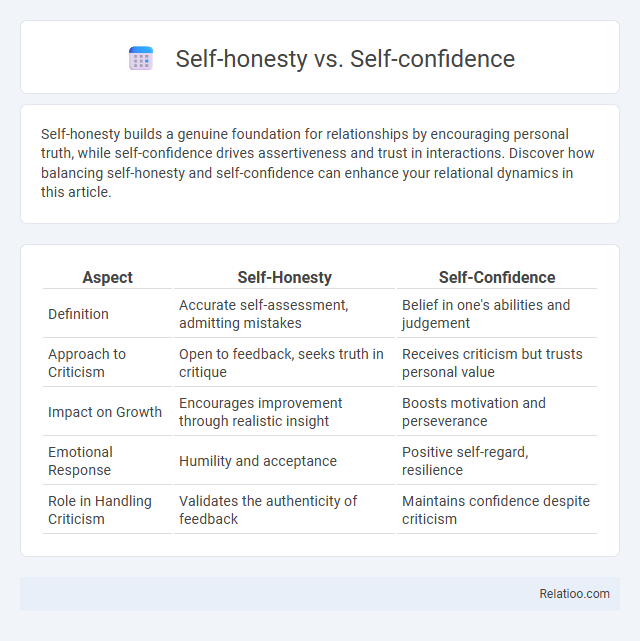Self-honesty builds a genuine foundation for relationships by encouraging personal truth, while self-confidence drives assertiveness and trust in interactions. Discover how balancing self-honesty and self-confidence can enhance your relational dynamics in this article.
Table of Comparison
| Aspect | Self-Honesty | Self-Confidence |
|---|---|---|
| Definition | Accurate self-assessment, admitting mistakes | Belief in one's abilities and judgement |
| Approach to Criticism | Open to feedback, seeks truth in critique | Receives criticism but trusts personal value |
| Impact on Growth | Encourages improvement through realistic insight | Boosts motivation and perseverance |
| Emotional Response | Humility and acceptance | Positive self-regard, resilience |
| Role in Handling Criticism | Validates the authenticity of feedback | Maintains confidence despite criticism |
Understanding Self-Honesty: Definition and Importance
Understanding self-honesty involves recognizing your true thoughts, feelings, and motivations without distortion or denial. It is crucial for personal growth because it fosters realistic self-assessment, allowing you to identify areas for improvement and make authentic decisions. Unlike self-confidence, which is about belief in your abilities, self-honesty demands a deeper, sometimes uncomfortable, truthfulness with yourself essential for genuine progress.
The Essence of Self-Confidence: Key Traits
The essence of self-confidence lies in a realistic awareness of one's strengths and weaknesses, enabling decisive actions without hesitation. Key traits include resilience, positive self-regard, and an internal locus of control that empowers individuals to face challenges with assurance. Unlike self-honesty, which demands truthful self-reflection, and self-esteem, grounded in overall self-worth, self-confidence specifically drives proactive behavior and goal achievement.
Core Differences Between Self-Honesty and Self-Confidence
Self-honesty involves an accurate and transparent self-assessment, recognizing personal strengths and weaknesses without bias. Self-confidence reflects a belief in one's abilities and potential to succeed, often fueled by past achievements and positive self-perception. The core difference lies in self-honesty's foundation in objective truth, while self-confidence is rooted in subjective assurance and emotional resilience.
How Self-Honesty Shapes Personal Growth
Self-honesty acts as the foundation for personal growth by encouraging you to acknowledge your true feelings, strengths, and weaknesses without distortion. Unlike self-confidence, which boosts your belief in abilities, self-honesty ensures you confront areas needing improvement, fostering genuine development and resilience. This authentic self-awareness creates a clear path to setting realistic goals and achieving meaningful progress.
The Role of Self-Confidence in Achieving Goals
Self-confidence plays a crucial role in achieving goals by fostering a positive mindset and resilience, enabling you to overcome obstacles and persist through challenges. While self-honesty involves recognizing your strengths and weaknesses truthfully, self-confidence leverages this awareness to build motivation and take decisive action. Balancing self-honesty with self-confidence allows you to set realistic objectives and trust your ability to accomplish them effectively.
Balancing Self-Honesty and Self-Confidence for Success
Balancing self-honesty and self-confidence is crucial for achieving sustained success, as self-honesty fosters accurate self-assessment while self-confidence drives proactive decision-making. Individuals who maintain self-honesty can identify their strengths and weaknesses objectively, enabling growth without succumbing to overconfidence or impostor syndrome. Cultivating this balance enhances resilience, emotional intelligence, and the ability to pursue goals with clarity and realistic optimism.
Common Misconceptions About Self-Honesty and Self-Confidence
Self-honesty is often misunderstood as weakness or self-criticism, whereas it actually involves an accurate and non-biased self-assessment, which is crucial for personal growth. Self-confidence is commonly mistaken for arrogance or overestimating one's abilities, but it actually stems from a realistic appraisal of skills combined with self-belief. Many confuse self-honesty with self-confidence, but true self-confidence relies on honest self-awareness without denial or exaggeration, making it essential to distinguish between genuine self-assurance and inflated ego.
Signs You May Lack Self-Honesty or Self-Confidence
Lacking self-honesty often manifests as denial of personal flaws and avoidance of uncomfortable truths, while a deficit in self-confidence presents through hesitation in decision-making and persistent self-doubt. Individuals struggling with self-honesty may justify negative behaviors or make excuses to protect their self-image, whereas those with low self-confidence might shy away from challenges and fear failure. Recognizing symptoms such as inconsistent self-perception and chronic indecision is crucial for developing both genuine self-awareness and a resilient sense of self-worth.
Practical Strategies to Cultivate Both Self-Honesty and Self-Confidence
Practicing self-honesty involves reflective journaling, honest self-assessment, and seeking constructive feedback to recognize personal strengths and areas for growth. Building self-confidence requires setting achievable goals, celebrating small victories, and engaging in positive self-talk to reinforce a belief in one's abilities. Combining these approaches fosters a balanced mindset where authenticity and assurance coexist, enhancing decision-making and personal resilience.
Long-Term Benefits of Embracing Self-Honesty and Self-Confidence
Embracing self-honesty allows you to recognize your true strengths and weaknesses, fostering personal growth and authentic relationships over time. Self-confidence builds on this foundation by empowering you to take risks and pursue goals with resilience and clarity. Together, self-honesty and self-confidence create a sustainable mindset that supports long-term success and emotional well-being.

Infographic: Self-honesty vs Self-confidence
 relatioo.com
relatioo.com